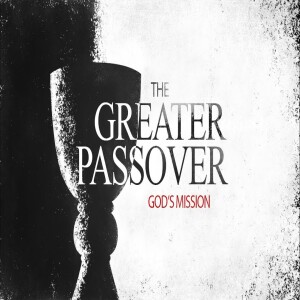
Wednesday Mar 28, 2018
God’s Mission - The Greater Passover
God's Mission: The Greater Passover
God's Mission - The Greater Passover

This Bible teaching from Founded in Truth Fellowship explores the concept of a "Greater Passover" through Yeshua (Jesus), arguing that it represents a more profound redemption than the original Exodus from Egypt. The teaching emphasizes that God is faithful to His promises and that Yeshua's life, death, and resurrection fulfill these promises. Matthew Vander Els suggests that the New Testament reveals a God who keeps His promises through Yeshua.
The Story of Israel and the Need for a Greater Redemption
The teaching reviews Israel's history, highlighting the cycle of turning toward God, falling into sin, and facing exile. Despite being chosen to be priests to all nations, they failed and were exiled. This pattern, exemplified by exile in Assyria and Babylon, reveals that returning to the land is insufficient. According to the speaker, prophets like Jeremiah, Hosea, Isaiah, and Amos pointed to a greater redemption that would transform the heart and cure the source of sin, not just change actions.
- King David is presented as the high point in Israel's history, with prophecies foretelling a son of David who would bring redemption with God's authority.
- The constant disappointment and wondering if God would keep His promises led the Israelites to retell the story of the Passover, emphasizing hope in God's faithfulness.
- The prophets foretold a future Passover and Exodus that would be bigger than Israel, involving the whole world and changing hearts for reconciliation with God.
Yeshua as the Fulfillment of God's Promises
The teaching emphasizes that the Gospel writers proclaim Yeshua as the fulfillment of every promise God made to His people. Matthew's Gospel presents Yeshua as the Messiah, the son of David and Abraham, who leads a new Passover and Exodus.
- Matthew uses the genealogy of Jesus to show a pattern: from Abraham to David (high point), from David to the exile of Babylon (downward spiral), and from the exile to Yeshua (rescue).
- Matthew stamps "David" all over the story to emphasize that the promised king has arrived to fulfill Israel's high point.
- The expectation of a Messiah was present in the first century, with some expecting a political or violent figure, but few anticipated a Messiah who would be a servant.
- During the Babylonian exile, the hope arose for a new redemption, a greater Exodus led by a greater Moses.
Yeshua as the Greater Moses and the New Passover Lamb
The speaker draws parallels between Moses and Yeshua, presenting Yeshua as the "greater Moses" who leads a greater Passover and Exodus. Jewish tradition also connects Moses and the Messiah, expecting a messianic figure like Moses. The Gospels intentionally portray Yeshua as the prophet who fulfills the prophecies of a greater Exodus and Passover.
- Yeshua's childhood mirrors Moses': both faced evil kings who attempted to kill them through mass slaughters of children. Both were hidden in Egypt to save them.
- Yeshua's miracles and acts of power are compared to Moses': casting out demons with the "finger of God," reminiscent of Moses overpowering pagan forces and receiving the Ten Commandments.
- Yeshua's Transfiguration involves Moses and Elijah, with a voice from a cloud saying, "Listen to him," echoing Deuteronomy 18. Luke's account specifically mentions their discussion of Yeshua’s "exodus."
- Yeshua is not only portrayed as Moses but also as Israel, representing the nation and fulfilling their vocation. He embodies Israel as the king whose faithfulness stands in place of their faithlessness.
- After being baptized, Yeshua goes into the wilderness for 40 days, mirroring Israel's time in the wilderness after the Red Sea crossing. He overcomes the temptations that Israel failed.
The Last Supper and the Transformation of Passover
During the Last Supper, Yeshua transforms the Passover meal, focusing on His future suffering and death instead of the traditional Exodus story. He identifies the bread and wine as His flesh and blood, instructing His disciples to eat and drink in remembrance of Him.
- Yeshua's transformation of Passover fulfills the prophecies of a greater Exodus and Passover. He evolves Passover into a day that reflects what God is doing through His death, burial, and resurrection.
- In Jeremiah 23, God speaks of a time when people will no longer speak of being brought out of Egypt, but of being gathered from all the countries where they were banished. This refers to the end of exile through the greater Passover.
- Yeshua gathers together Israel, not based on bloodline but on those who do the will of God, for their true Exodus and greatest Passover.
- Through Yeshua, slavery to sin has ended, and freedom from the oppressive power of death is available. He destroys the works of the devil and delivers believers from the domain of darkness.
Application for Everyday Life
- Recognize God's Faithfulness: Remember that God is a keeper of His promises, even in the face of disappointment and uncertainty.
- Embrace the New Creation: Understand that salvation, new creation, restoration, and reconciliation with God are available now, not just in the future.
- Overcome Sin: Recognize that through Yeshua, believers have the power to overcome sin and experience freedom from its oppressive power.
- Be Part of the Kingdom: Know that believers are part of a chosen people, a royal priesthood, a holy nation, and God's special possession, called to declare His praises.
- Lean on God's Mercy: Even in times of uncertainty or feeling far from God, trust in His constant patience and forgiveness.
To find more Bible Teachings, click the link.
References
- Exodus 1
- Exodus 2
- Exodus 4
- Exodus 12
- Deuteronomy 18
- Matthew 1
- Matthew 17
- Luke 9
- Colossians 1
- 1 Peter 2
Resources
Note: This article contains affiliate links.
No comments yet. Be the first to say something!